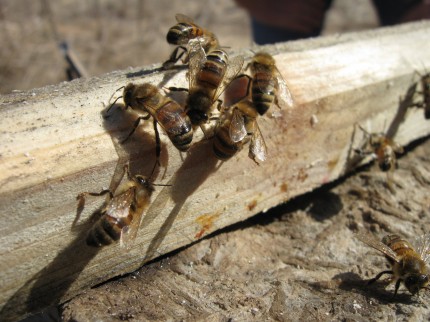Member Profile: Great minds think alike, fools seldom differ
Posted: June 5, 2012
Categories: GoodFoodBites / Member Profiles / News from Sustain Ontario
By Stephanie Verkoeyen
Greg Hounsell and Gord Campbell aren’t likely to be mistaken for fools. In 2008, the long time friends decided to enter the beekeeping industry, and Seldom Fools Apiculture was born in Kingston, Ontario. Starting with just two hives, the operation has since expanded to incorporate fourteen hives with six more planned for later this month.
As a child, many hours spent with bugs and a long-time fascination of bees made this a natural fit for Gord Campbell. “I’ve always had a deep-seated interest in agriculture and food concerns, as well as bee survival issues,” Mr. Campbell said. He admits to looking into keeping bees in the past, but being turned off by the legislation regulating apiculture. Then, about five years ago, he came across a vibrant community in treatment free beekeepin g. “We weren’t using standard hives, we didn’t have smokers and we weren’t giving our bees the standard treatment regimen of medications and chemicals.” This sentiment underscores the philosophy of Seldom Fools: the bees know what they’re doing.
g. “We weren’t using standard hives, we didn’t have smokers and we weren’t giving our bees the standard treatment regimen of medications and chemicals.” This sentiment underscores the philosophy of Seldom Fools: the bees know what they’re doing.
Most of us are familiar with the stacks of white boxes found bordering farmers’ fields. Based on a design patented in the US in 1851, these hives are convenient for beekeepers to work in, but are nothing like what bees build in the wild. Instead, Seldom Fools uses a hive designed for African development projects in the 1960s, modified to suit Canada’s climate. Oriented horizontally, the hive approximates a hollow log hive, in which the bees can build honey combs that suit their needs.
Seldom Fools is about more than just honey. It’s a business centered around: bees, hives, propolis, wax and sustainability. Seldom Fools has run two workshops so far, to further this idea of sustainability and educate people on organic beekeeping practices. Initially there was some uncertainty over public interest levels, but these fears were put to rest after the first workshop sold out in a week. “There’s been a lot of interest; we’ve received emails from people all winter,” Mr. Campbell said. The interest is primarily from individuals wanting to keep bees in their backyards. Be on the lookout for a series of workshops this summer.
Canada has lagged behind the United States in terms of organic beekeeping, with more tolerant standards than in some areas. In Ontario, there is currently a setback regulation of 30 m from the property line, but there has been talk of amending the Ontario Beekeeping Act. There is currently no organic beekeeping association in Ontario, but the value of such an organization is becoming more apparent as concern for the future of apiculture grows.

